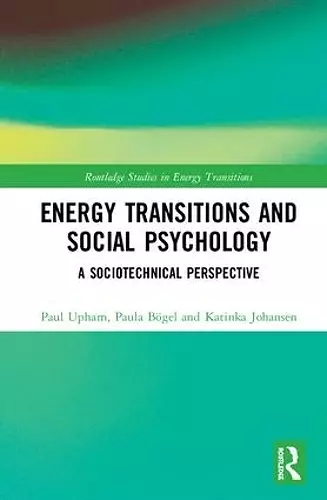Energy Transitions and Social Psychology
A Sociotechnical Perspective
Paul Upham author Paula Bögel author Katinka Johansen author
Format:Hardback
Publisher:Taylor & Francis Ltd
Published:21st Feb '19
Currently unavailable, and unfortunately no date known when it will be back
This hardback is available in another edition too:
- Paperback£43.99(9780367661465)

This book explains how social psychological concepts can be closely integrated with sociotechnical perspectives of energy transitions. It shows the value of actor-centred analysis that acknowledges the role of individual-level processes within their wider contexts of energy supply and use. In this way, the book connects social psychological and sociological frames of analysis, preserving the value of both, to provide multi-level, analytically extended accounts of energy transitions processes.
Sociotechnical thinking is about the interactions of people and technology, including the rules, regulations and institutions involved. Such perspectives help to identify the many forms of path dependency that can make change difficult. Human behaviour plays a strong role in maintaining these path dependencies, but it can also introduce change. This book advocates a deliberately interdisciplinary research agenda that recognises the value of social psychological perspectives when seeking to create new pathways for energy supply and use. At the same time, it also demonstrates the value of sociotechnical perspectives for energy-related social psychology.
Energy Transitions and Social Psychology will be of great interest to students and scholars of energy transitions, environmental and energy psychology, sustainable development and innovation studies, as well as students and scholars of environment and energy more generally.
"Current discussions about transitions are often dominated by techno-economic perspectives that obsess over elements like carbon and cost. This book takes a refreshing departure from that paradigm, and it explores the cognitive, psychological and behavioural elements underlying those very same transitions. It underscores that if we truly want a more sustainable future, we need to change not only the technologies we build and the market mechanisms we design, but how we think about ourselves, society, and the sociotechnical systems embedded between them all." -- Benjamin K. Sovacool, Professor of Energy Policy at the Science Policy Research Unit (SPRU) at the School of Business, Management, and Economics, University of Sussex, UK
"Transition studies and (environmental and social) psychology have strongly contributed to our understanding of sustainability transitions. However, and surprisingly, the streams of literature have so far developed in relatively unconnected ways. I thus consider this book a valuable addition to the literature." -- Elisabeth Dütschke, Senior Scientist at Fraunhofer Institute for Systems and Innovation Research (ISI), Germany
"This timely book is a must-read for all transition scholars interested in studying agency in sustainability transitions. It is also a welcome invitation for a greater engagement of social psychologists in studying the role of individuals within larger socio-technical transition processes towards sustainability. May it inspire new interdisciplinary research leading to an enhanced understanding of how to accelerate sustainability transitions in sectors such as energy, mobility or agro-food." -- Karoline Rogge, Senior Lecturer at the Science Policy Research Unit (SPRU) and Co-Director of the Sussex Energy Group, University of Sussex, UK, and Senior Researcher, Fraunhofer ISI, Germany
"This is an important book for social scientists and others concerned with sociotechnical transitions. The authors have identified and explored a hugely significant aspect of energy transitions and energy technology diffusion, acceptance and use: the connection between individual-level psychology with sociotechnical processes. The message is very relevant: social psychology is not only important to sociotechnical transitions in the context of energy supply and use, but that the differences in analytic levels are bridgeable." -- Christian Oltra, PhD, Senior Researcher at the Centro de Investigación Socio-Técnica, CIEMAT Barcelona.
ISBN: 9781138311756
Dimensions: unknown
Weight: 453g
194 pages